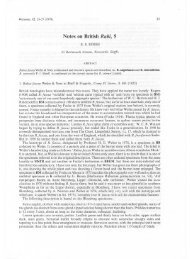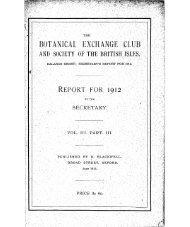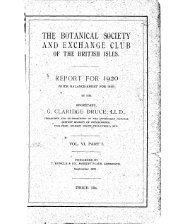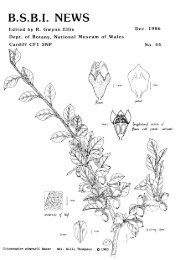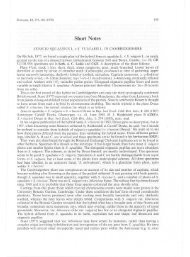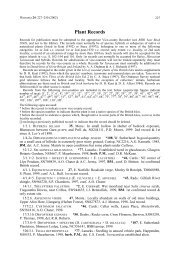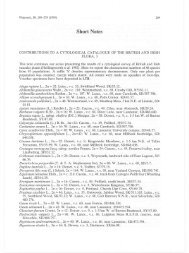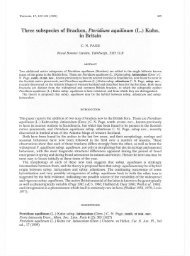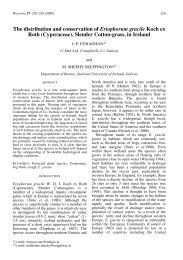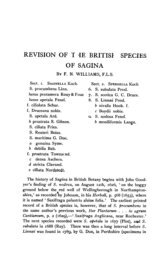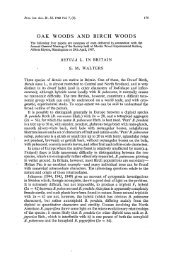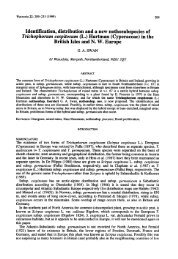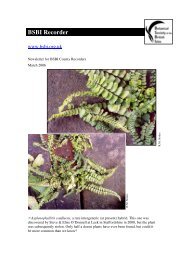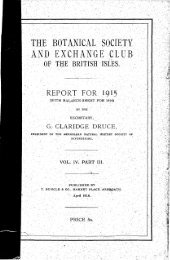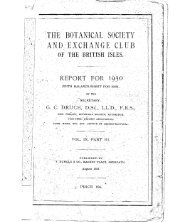Create successful ePaper yourself
Turn your PDF publications into a flip-book with our unique Google optimized e-Paper software.
NEW PUBLICATION. 273<br />
themselyes by thinking that the produce they might be able to send to Europe<br />
would materiaUv affect the prices.<br />
" We started early next morning, and soon after left the cart-road, which<br />
ever since our departure from Leon we had been able to follow, and which<br />
passed over tolerably level gi'ouud, though round the large volcanoes and over<br />
fields of lava. The road we now took, Cleto informed us, was a short cut, but,<br />
like most short cuts if one is not quite familiar with them, it turned out to be<br />
rather a long one. The whole day we did not see a house or meet a single<br />
human being, and, except two stagnant pools, the only water we found was a<br />
Httle brook. On advancing, the country became more hilly, and we had to<br />
cross valleys full of large boulders, resting on black mould, in the rainy season<br />
one mass of mud. It was very warm indeed, and, as most of the trees were<br />
quite leafless, as ours are in the depth of winter, we suffered very much from<br />
the sun. We soon finislied a few bottles of water which we carried along with<br />
us, and to quench our thu-st ate some Hog-plums and ' uvas ' {Ardisia coriacea).<br />
One of the valleys was full of trees bearing fruits like Oranges ; and Captain<br />
Holman, delighted at the sight, galloped ahead to gather some. To his disappomtment,<br />
though not to mine, these ' Oranges ' turned out to be the fruit of<br />
a Calabash-tree {Crescentia alata), the seeds of which the Nicaraguans make<br />
into a cooling drink, and sell in some of the shops of the towns, whilst the<br />
shell is turned into drinking-cups. After continued travelling in this inhospitable<br />
region, we were glad to perceive, towards simset, a farm, which stood<br />
on the top of a hUl, and rejoiced in the name of Hacienda de Pdon. This<br />
farm struck me as the most tidily kept in the whole of Xicaragua, the principal<br />
dweUing-house being extremely clean and comfortable. An evergreen Fig-tree,<br />
with a crown of gigantic dimensions, was diffusing a dehcioua coolness and<br />
shade around the place."<br />
After leaving Achuapa, a tolerably large village,<br />
" The road passed Las Tablas, where for the first time we found ourselves in<br />
a most delightfully cool temperature, and in a forest of Fir-trees {Pinus tenuifolia,<br />
Benth., known by the name of ' Ocote,' a corruption of the Aztec<br />
(Mexican) ' Ocotl. ') I may, however, add that this is not the most southern<br />
limit of the Pines on the Pacific side of America, but that it is, as far as at<br />
present ascertained, in latitude 12° 40' north, on the Volcan Tiejo, near Chinandega,<br />
at an elevation of three thousand feet above the sea-level, whilst the<br />
most northern hmit, as I have shown in - my Flora of Eskimoland, is on the<br />
banks of the river Xoatak, in latitude 66° 44' 0" north, where Captain Bedford<br />
Pim found a regular forest composed of a species (Abies arotica, A. Murr.)<br />
closely allied to the White Pine. We did not long remain in this deUghtfully<br />
cool atmosphere, but were compelled again to descend into the hot valleys,<br />
passing the village of San Juan de la Maya."<br />
The journey thence led to the farm of Bonbon.<br />
" We left Bonbon early the next morning, and travelled about three leagues<br />
more in the liot valleys, the vegetation of which was very much like that of<br />
the Pacific coast of the Isthmus of Panama, many of the species being identically<br />
the same in both countries. Again ascending some mountam-ridges, we<br />
were once more greeted by the Pine-trees and a dehghtfidly cool breeze. Here<br />
I found a species of Oreopanax with large palmate leaves, new to me ; a<br />
pui-ple Salvia, a pink Melastomacea, and Pteris aquilina ; a species of Rhipsalis<br />
grew on the Pine-trees. Saw no snakes, and only one monkey, some<br />
luacaws, and that beautiful bird with two long feathers in tail, the Trogon re-<br />
—



